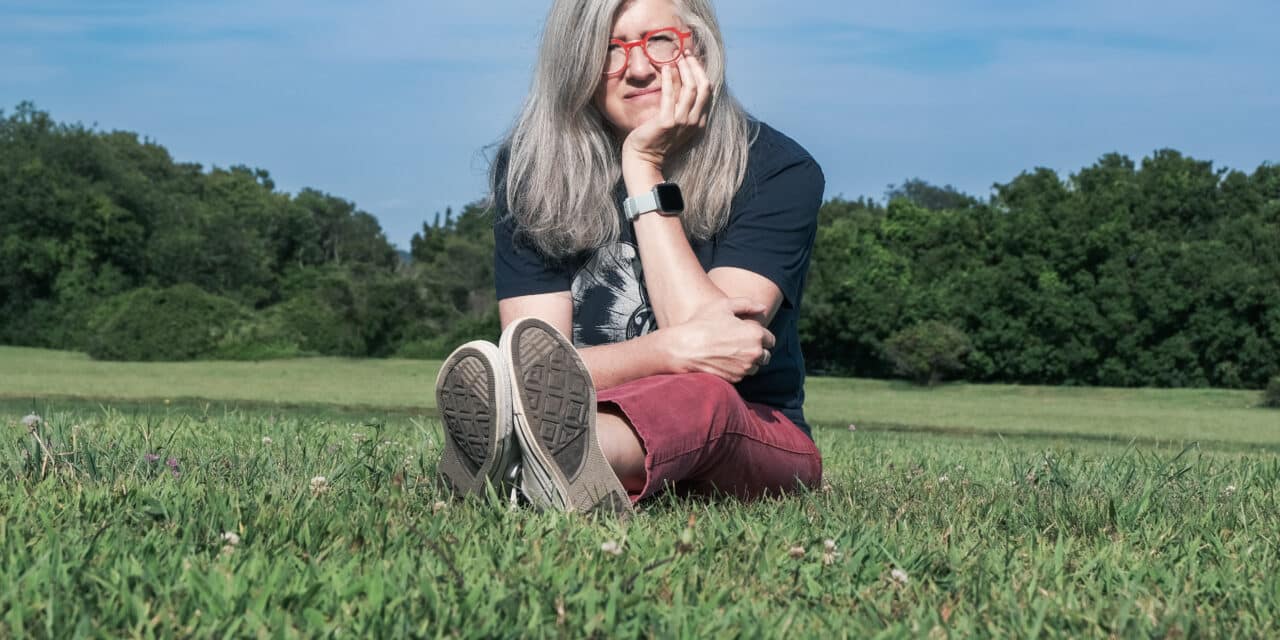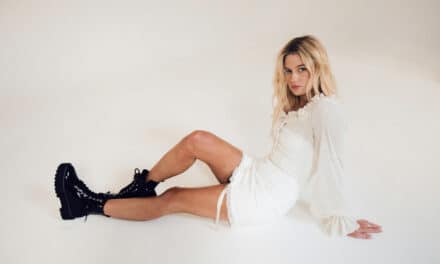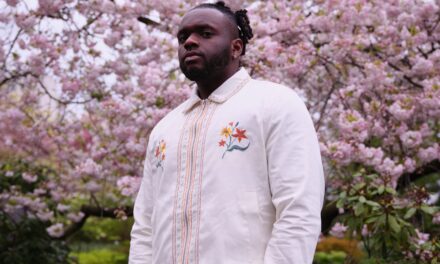Poet, musician, and eternal shape-shifter Karen Schoemer has announced her new album August, arriving November 7 via Dromedary Records. The project, a genre-blurring exploration of language and sound, pulls together an impressive constellation of collaborators: Mike Watt, Amy Rigby, Steve Almaas, Madeline Darby & Body Memory, Zak Boerger, Eric Hardiman, Parashi, Wednesday Knudsen, and more.
The lead single, “August 30,” featuring Oli Heffernan (her partner in Detective Instinct), is streaming now on Bandcamp. It’s a track that feels both intimate and expansive, with Schoemer’s words cutting through like diary fragments while the music swells around her voice like memory folding in on itself.
At its core, August is an homage to poet Bernadette Mayer, whose radical 1971 project Memory catalogued a month through photographs and relentless daily notes. Schoemer mirrors that process with 31 collage-like pieces drawn from her own raw August 2022 writings—later reshaped during weekends at Herman Melville’s Arrowhead, the very house where Moby-Dick was born. The resulting work feels like a lived-in document: fragments of time, stitched into something permanent.
The album’s creation was as intimate as its concept. Vocals were tracked at home in winter 2024–25, with Sky Furrows bassist Eric Hardiman co-producing, mixing, and mastering. It’s a project that folds Schoemer’s multiple identities into one: the poet, the musician, the archivist of fleeting moments.
For those who’ve followed her orbit, Schoemer is anything but a newcomer. She’s lent her voice and vision to bands including Sky Furrows, Jaded Azurites, Ivan the Tolerable, Day for Nights, and Karen & Peter. Her history stretches back to collaborations with Mike Watt and Heffernan on Detective Instinct’s early EPs, through two full-lengths with Sky Furrows—Sky Furrows (2020) and Reflect and Oppose (2023)—and a string of stages shared with underground mainstays like Oneida, Garcia Peoples, and Sweeping Promises. Even her bass/voice duo with Watt, Jaded Azurites, has been quietly prolific, releasing seven digital EPs since 2018.
But Schoemer’s story isn’t just about music—it’s about language itself. A former music journalist, she published Great Pretenders: My Strange Love Affair with ’50s Pop Music in 2006, hosted The Schoemer Show on WGXC 90.7 FM, and later earned an MFA in creative writing in Brooklyn. Studying directly with Bernadette Mayer in the mid-2010s, she found herself drawn deeper into the wild edges of experimental poetry. August is, in a way, the culmination of that journey—a record that feels like poetry set to tape, an echo of time refracted through community, loss, and sonic devotion.
August is out November 7 on Dromedary Records. Until then, step into the haze of “August 30” and hear the month unfold.
Pre-order the album here: https://
Your new album August was inspired by Bernadette Mayer’s Memory, which merged daily life with experimental language. How did you translate that approach into music and poetry for this record?
Bernadette’s method, as I understand it, was to take copious notes and photographs and go back later to assemble an experimental narrative for each day. It was a study of memory. My project was more to create raw material and then excavate material to make a poem that was a different time layer. It’s a subtle difference but I wasn’t trying to remember or reconstruct – I extracted words and phrases to create new context and new meaning. That was the poetry part. The music part was an insane, giddy idea to make an album once the poems were finished. I invited friends to send me short pieces of music with no guidelines except the title was August. And they generously did. The poems and booklet were completely finished before I listened to a single track.
I love writing to music, most of Sky Furrows songs are written that way – I get a demo or progression and come up with words in response. In this instance I wanted the poems to be poems first. This gets into a can of worms about poems versus lyrics which I’ll avoid answering for now!
You wrote the source material for August during one month in 2022, then reassembled it at Herman Melville’s Arrowhead. How did being in that historic literary space shape the process?
The Mastheads cabins at Arrowhead are spartan, miniature buildings without bathrooms, internet or electricity. I wanted that removal from comfort and distraction, it left me alone with the work in a useful way. Melville is my favorite author so it was deeply inspiring to be on his property, to think about his legacy and creative and social values, to hang out in his fields and look at mountain views which essentially haven’t changed since his time.
“August 30” introduces the record with a collage-like intimacy. Why did you choose that track as the lead single, and what does it reveal about the larger body of work?
Dromedary chose that as the first track release. Oli Heffernan wrote the music and his tracks are more structured and song-like. Other tracks are ambient or noisy. It’s nice to have that balance on the album but also nice to have a more accessible track introduce the record.
The album features collaborations with icons like Mike Watt and Amy Rigby, alongside newer voices like Madeline Darby & Body Memory. How do you approach curating such a wide-ranging community of collaborators?
I don’t mind the word “curate” as much as some people do but this was definitely not an act of curation. These were people I’d been lucky to work with, musicians and friends who nurtured and welcomed me into music-making and helped me transition from writer-only to writer who also performs and collaborates and records. It’s a pretty diverse group but it all makes sense somehow. Even Sarah and Angie’s electronic pieces make sense with Oli and MaBH (Peter Taylor) who use electronic or collage elements. There’s a run of noise and distortion from around August 16 to 20, with Parashi (Mike Griffin), Eric Hardiman and MaBH, which I like a lot. It’s all chance, it just happens to be what people contributed and the music brings out emotional colors in the poems that might have stayed hidden.
Your practice sits at the intersection of poetry, performance, and music. When you’re writing, do you hear the words as spoken, sung, or something in between?
Even poems that stay on the page need to be speakable – they need to sound natural in my voice. So I read everything out loud whether it’s going into a song or not.
The passing of your collaborator Zak Boerger earlier this year adds a bittersweet note to August. How does his presence live on in this album?
I was able to share the finished track with Zak and got a couple of hearts back in response. He never heard the finished album, and actually Sarah Darby never heard her tracks with vocals. Zak and I worked on the Day for Nights record knowing it would probably be his last record so there’s closure there. We finished it and got it out and both felt proud. Loss is loss, though, and I ache for both of them.
You’ve gone from music journalist to poet, performer, and recording artist. How has that shift in perspective, from observing to creating, reshaped your relationship with music?
As much as I lived and breathed music for years as a journalist, I was outside it and it felt mysterious and magical. When I interviewed people my line of questions was often, how did you do that? How did you get that sound? What gave you that idea? Being in a band and collaborating helped me realize it’s not, like, wizardry. Great music is sweat and persistence and practice and time and dedication and devotion. Every performance is the accumulation of the tries that came before it. Poetry is like that too, every poem builds on the poems that came before, what you got wrong and came at from a different angle, every problem you worked at solving. It’s amazing to be part of music-making now, I love being in the room when music happens, and I really love projecting words into that palette of sound.
Sky Furrows, Jaded Azurites, Detective Instinct, each of your projects has its own sonic identity. Where does August fit in that constellation?
August could almost be a compilation except that my voice never lets up and that obviously stamps unity on it. It’s like a novel with ten different protagonists. The same person in 31 rooms.
The record was co-produced and mixed by Eric Hardiman. How did working with someone so close to your creative orbit influence the final sound?
Eric is an extraordinarily generous person. I had the poems written and paired with pieces of music but I could not do the vocals without someone listening. Mike Watt does that in Jaded Azurites, he’s the audience. He listens and says “yes” or “no.” I don’t do mixing and that was a peculiar problem because the tracks came pre-mixed and my vocals had to slide into them naturally. I didn’t want the vocals to sound disembodied. Eric stepped up and offered. He mixed but he ended up doing so much more. He’s open and non critical and encouraging. I needed that kind of support, I just can’t imagine it getting made without Eric.
The title August carries both a temporal and emotional weight, heat, transition, reflection. What does August mean to you now, and what do you hope listeners carry from the album?
August is my birth month and even with climate change ruining everything it’s still my favorite time of year. It’s wistful because summer has peaked and is starting to fade, but the light is heavy and golden and insect sounds are everywhere. It’s a lazy, sated, wind-down time. It feels good to have roused those feelings into poems and songs. I hope it awakens sensitivity in people. I hope it reminds them, “Oh yeah, instead of being desensitized by fascists and driven to despair, I should focus on the sound of a cricket or the miraculous shape of a low-lying cloud.” Fascism doesn’t stand a chance against the smell of green walnut skin.





